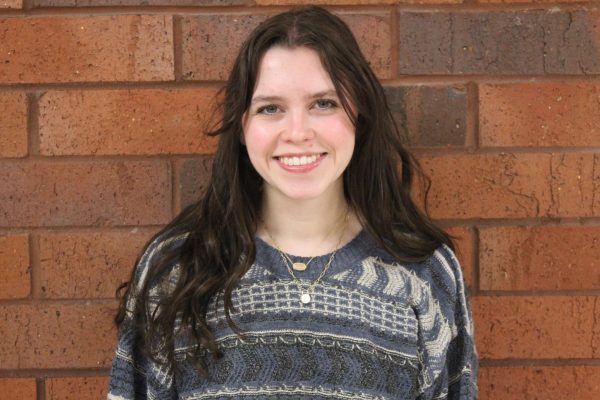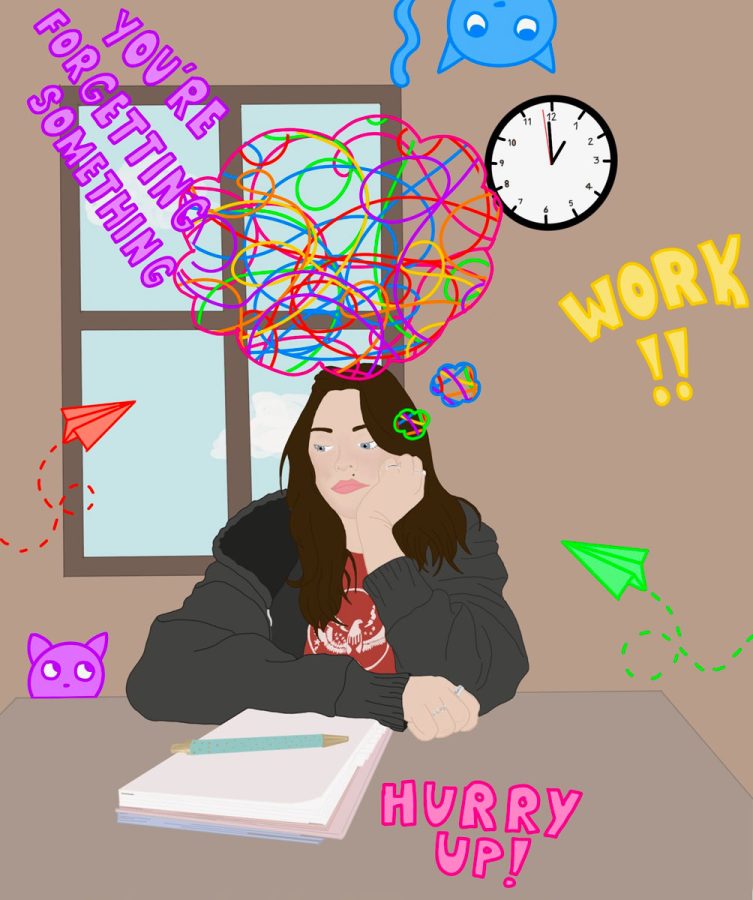My ADHD diagnosis, long overdue
I wrote this article at the last minute, big surprise
Photo by Olivia Mathie
Getting my diagnosis at 20 was the most validating moment of my life, but it also made me sad.
I grew up taking ages to finish assignments and paying meticulous attention to details. I spent elementary school nights crying over assignments I couldn’t get quite how I wanted.
My teachers and parents chalked it up to being an intelligent kid and a perfectionist.
I spent many middle school recesses inside finishing tests that other kids finished in under one class period because I had to read directions over and over to make them stick in my brain.
The answer, of course, is that I was just a little absent-minded. I needed to try to focus harder.
I got to high school and Scantron exams were my worst enemy.
Besides the fact that that many problems in a row made me feel like my eyes were going to fall out of my head, I spent almost as much time as I did answering questions going back and fixing the order of them because I kept skipping over rows of bubbles.
My dad taught me to go back and count my answers to every problem to make sure I didn’t miss any, and I stopped making so many goofy mistakes.
I was a straight-A student the moment the plusses and minuses on report cards turned into letter grades, and I left middle school as a very accomplished 14-year-old.
I won awards for writing, math and music. I wrote my school’s spring play. I took the ACT early because I was in the 99th percentile on every standardized test.
And then I got to high school and crashed.
I was the definition of gifted kid burnout syndrome.
Despite what people thought, nothing I accomplished had ever come easy to me. I layered honors classes on AP classes on a varsity sport, and my brain couldn’t keep up anymore.
I spent my entire life masking and overcompensating to keep up with everyone else, and I was exhausted.
Growing up, people didn’t really talk about mental health, and if they did, it always had a negative connotation.
People with depression were lazy. People with anxiety needed to suck it up. People with bipolar disorders needed to get a grip.
And then there was ADHD, which was only diagnosed in little boys with excessive energy.
Then junior year of high school, I finally started putting the pieces together.
Maybe I didn’t have issues with focus and procrastination because I was lazy. Maybe the excess energy, trouble with organization and chronic lateness weren’t a lack of self-discipline.
I talked to my therapist and finally scheduled an ADHD test, and it came back inconclusive. She chalked my symptoms up to anxiety and dropped the idea completely.
I was really disheartened by these results, but I couldn’t let go of the idea that what I was feeling was something besides anxiety.
Two years later, my therapist changed jobs and I was assigned to a new one. I mentioned in passing that I’d been tested for ADHD a while ago, then didn’t bring it up again for months.
I was in college now, struggling with motivation and focus more than ever, and brought up that I thought it could be ADHD. My therapist responded that when I told her I’d been tested she’d just assumed I was already diagnosed.
She helped me get a second ADHD test scheduled, this one much more complex than the last, which had consisted of only a TOVA test.
This one would have not only a TOVA test, but the Brown Executive Function/Attention Scales, a CAARS self-report and two CAARS observer reports.
Two months later, I finally got tested again. The TOVA came back normal, but every symptom on the self-report and the observer reports was off the charts.
I expected to be diagnosed with inattentive ADHD, which is incredibly underdiagnosed in women since the symptoms don’t match up with the hyperactive symptoms so often noticed in little boys, but my results surprised me a little.
I was diagnosed with combo inattentive and hyperactive ADHD.
I didn’t think this result made sense at first, and then I looked through the charts on my results sheets where hyperactive symptoms were reported just as highly as inattentive ones, and read the descriptions of my symptoms.
Interrupting to get my ideas out before I lose them. Constant fidgeting. Trouble sitting still. Impulsive behavior.
It all made sense.
Getting my diagnosis at 20 was the most validating moment of my life, but it also made me sad. Years of struggling that felt like personal inadequacy were symptoms.
I wished I could go back and tell my younger self it wasn’t her fault and that she wasn’t a failure. But at the same time, how much of my bubbly personality was just a disorder?
I got the diagnosis not even a week ago, and it’s still a lot for me to process, but it’s opened the door to finally find solutions for things I’ve struggled with my entire life, and for that, I am incredibly grateful.
Price can be reached at [email protected].

Kyra is a third-year psychology and public health student. This is her fifth semester on The Spectator. In her free time, she likes to listen to a borderline concerning amount of music (like 40-70 hours a week) and attend any concert she can get her hands on tickets for.











